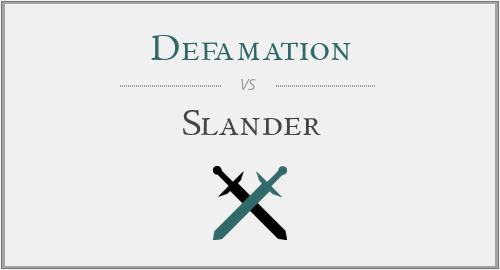
Defamation, slander, and libel are often used interchangeably, and their meanings are often confused.
Do they mean the same thing?
These three terms belong to the same area of law and they all concern communication that falsely degrades the character of a person.
What is Defamation?
1. Defamation is the broadest of the three terms, and it refers to a false statement that is either spoken or printed. Defamation causes harm to the character of a person or a business, injuring their reputation without justification.
2. Slander and libel are both types of defamation.
“Slander” is when this defamation is spoken out loud.
“Libel” is when this defamation is made in writing.
There is often a fine distinction between a person’s constitutional right to “freedom of speech” and their right to make defamatory remarks that hurt another’s character or reputation.
It is true that people have a right to speak their opinions, even when they are unpopular and even offensive.
When a person uses defamatory statements and commits libel or slander, they are crossing that line that separates their constitutional rights from the unlawful act of injuring another person.
What is Slander?
2. Slander is oral defamation. It is when someone says something false that does personal or economic damage to a person or a business. Although people have a constitutional right to express offensive and unpopular opinions, there is a legal line that can be crossed, and when that happens, slander is against the law.
• The statement must contain elements that are harmful to a person or to the reputation of this person.
• The statement must be shown to have been motivated by either a desire to harm or by negligence on the part of the accused slanderer.
An Example of Slander
During a PTA meeting in the local high school, a parent falsely claims that the principle has been charged with accepting a bribe. This is slander because this accusation was spoken out loud, it was communicated to a group of people, and it was shown to be a false accusation.
Another Example of Slander
A customer at a restaurant said out loud that the food was not tasty and that the service was horrible. These statements are their opinions. But then, this customer went on to falsely accuse the restaurant of serving food that was made with spoiled ingredients, causing other customers to leave the restaurant. This is now an example of slander because it was an untrue statement, it was spoken as though it was a fact, and it affected the business success of the restaurant.
What is Libel?
2. Libel is written or broadcast defamation. Like slander, it is a statement that is false, and causes damage to a person’s reputation and financial situation, and it is done with an intent to harm.
For example:
A magazine prints a story stating that a well-known athlete cheated on his wife with another celebrity. During the lawsuit, it was shown that the magazine only included aspects of the story that they believed to be accurate. The lawsuit was rejected because it could not be proven that the magazine had acted with an intent to actually harm the athlete, and so the magazine was protected by the First Amendment.
3. Libel can reach a wider range of people than slanderous words that are spoken and not documented.
The written word can be published in newspapers, books, and social media, and it can be spread, republished, and stored in computerized memories that can continue to be accessed over time.
4. All U.S. states have civil libel statutes, meaning you can sue those who have spread and published false statements about you. A few states also still have criminal libel laws on their books too.
5. There are two types of libel: “libel per se” and “libel per quod.”
*In Latin, the words “per se” mean “on its face.”
“Libel per se” refers to statements that are overtly defamatory, such as statements that accuse someone of being a criminal, accuse someone of having a disease that is stigmatized, or a statement that accuses someone of behaving in an incompetent or criminal way in their work environment.
The negative effects and harm resulting from libel per se is considered obvious and does not need to be proven legally.
*In Latin, the words “per quod” mean “undercover.”
"Libel per quod” refers to statements that the underlying circumstances need to be explained in order to understand the significance.
Cases of “libel per se” are simpler to understand and prove in a court of law. Cases of “libel per quod” are much harder to prove because the facts are covert and less straight-forward.
Final Thoughts
Slander and Libel are both forms of defamation.
In the early years of U.S. law, slander was thought to do more damage, because communication was usually spoken face-to-face, and literacy rates were lower. Later, with the rise of mass media and the written word, libel began to cause the most damage to a person and his reputation.
Both types of defamation are civil offenses and have resulted in fines of various severity. In certain circumstances, defamation has been found to be a criminal offense, as well, and those found guilty have been sentenced to time in jail.




Have a discussion about this article with the community:
Report Comment
We're doing our best to make sure our content is useful, accurate and safe.
If by any chance you spot an inappropriate comment while navigating through our website please use this form to let us know, and we'll take care of it shortly.
Attachment
You need to be logged in to favorite.
Log In